10 Best Free Agriculture Courses for 2025
Learn about agriculture, from starting your own hobby garden or farm, to agribusiness, pest control, and sustainable farming including conservation of soil and water.
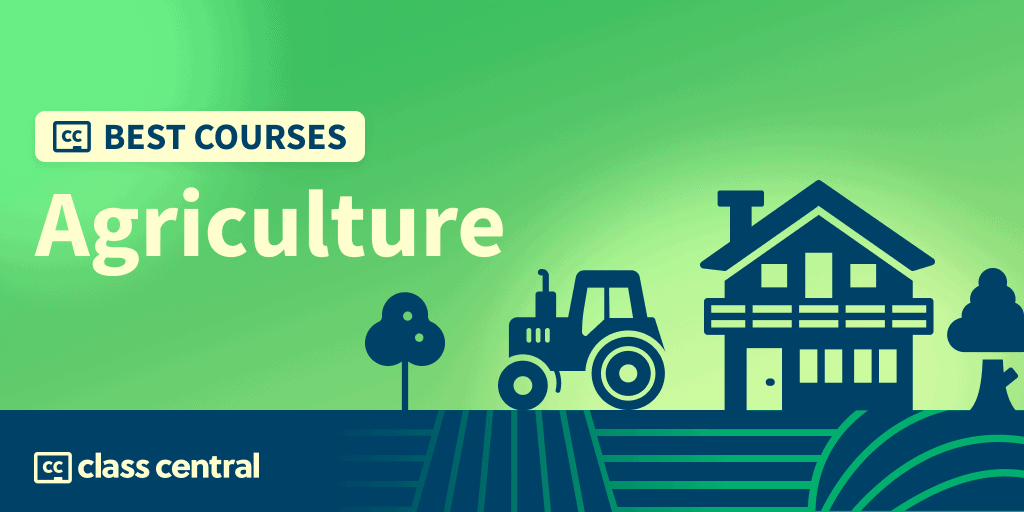
I grew up on a farm. My family grew papaws (papaya), pineapples, bananas, and many other crops during my childhood. Even now, I have a deep interest in farming. If you’re interested in agriculture, either as a hobby or to make a living, take a look at this Best Courses Guide (BCG). I’ve collated ratings and reviews from Class Central and course providers to narrow down the best choices from more than 1000 agriculture courses in our catalog. You’ll find free courses on sustainable and organic agriculture, learn how to establish your own farm or garden, or employ the latest technologies to increase production, conserve resources, and manage pests. And the list even includes a bonus (paid) course on growing and marketing microgreens.
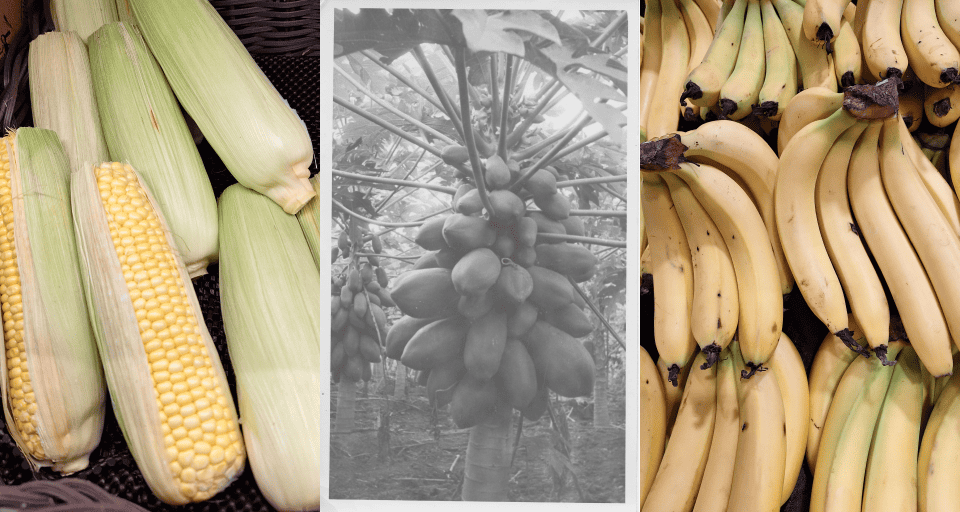
Several courses are created by universities in the USA, Europe, India, and Australia. We’ve also thrown in some super offerings from The World Bank Group and independent instructors.
Click on the shortcuts for more details:
Here are our top picks
BCG Stats
- 10 courses are free or free-to-audit and 1 is paid
- 6 courses offer a certificate of completion
- The agriculture subject is followed by 40.7K learners on Class Central
- The most featured provider is YouTube with 5 courses.
Best Sustainable Agriculture Course (University of Florida)
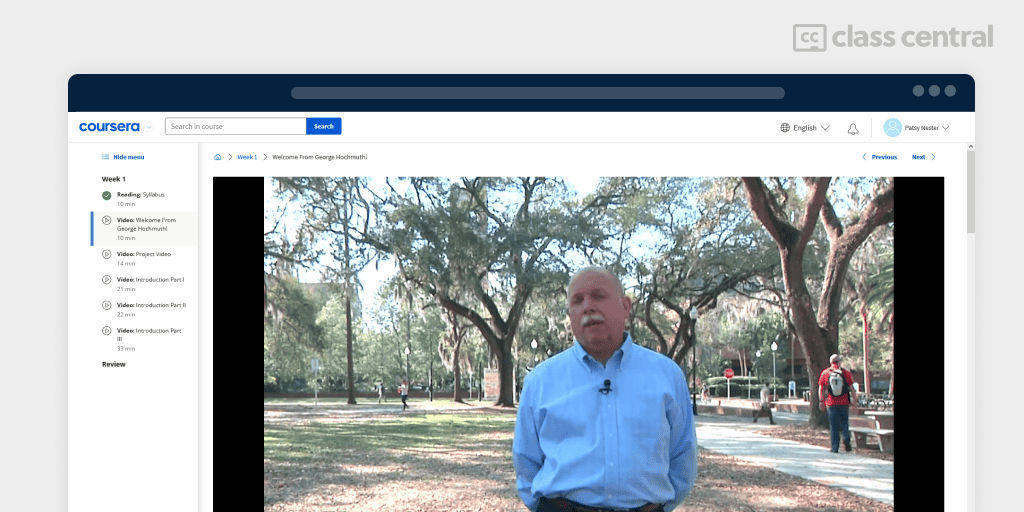
Sustainable Agricultural Land Management is perfect if you want to understand the science and policies behind agricultural best management practices (BMPs). Using examples from Florida and elsewhere, this course provides a comprehensive study of land and nutrient management strategies, even if you’re a beginner. Take advantage of this opportunity to enhance your knowledge on sustainable agricultural practices and water conservation with a focus on real-world applications and policies.
You will:
- Gain an understanding of agricultural and urban water quality issues, particularly in Florida
- Learn about the value of agriculture and the regulations that govern water quality, including Total Maximum Daily Loads (TMDLs) and nutrient management
- Explore the science behind BMPs and how to evaluate BMP research
- Delve into soil and nutrient management, including soil testing and nutrient mass balance
- Understand the intricacies of water use in agriculture, focusing on Florida’s water resources and irrigation management.
“Best course yet on sustainable farming practices. Professor speaks from experience and lays out the history and current landscape very clearly.. avoiding ideologies, judgment and speculation.” – VK, Coursera learner.
| Provider | Coursera |
| University | University of Florida |
| Instructor | George Hochmuth |
| Time Commitment | 20 hours |
| Enrollment | 49.2K |
| Rating | 4.8/5.0 (593) |
| Cost | Free audit |
| Certificate | Paid |
Also Great Sustainable Agriculture Course (University of Copenhagen)
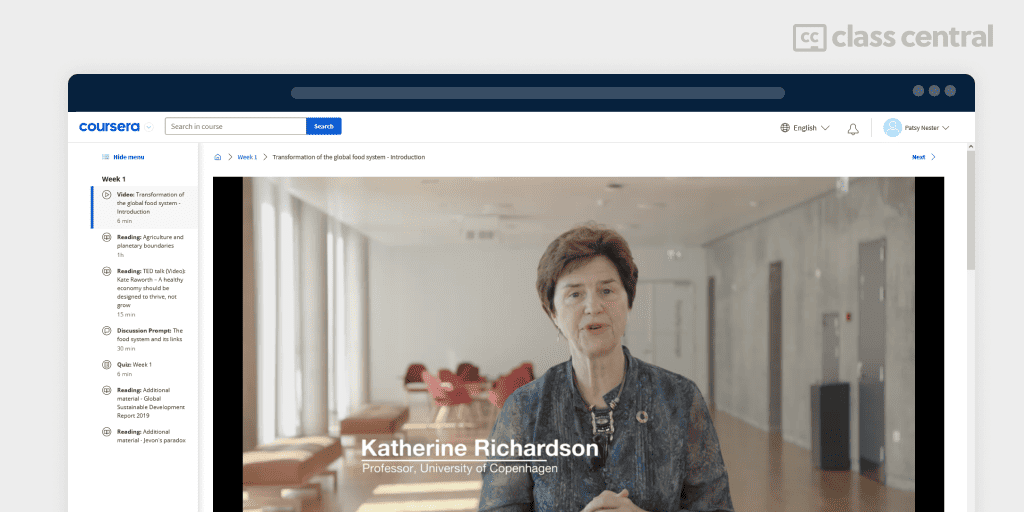
By the end of Transformation of the Global Food System, you’ll have a clear understanding of what it takes to transform the global food system to sustainably meet the needs of Earth’s growing population.
This course is suitable for anyone wanting to study the challenges and potential solutions for creating a sustainable global food system. It covers the entire food system from small farms to large-scale agricultural practices, and from reducing food waste to changing dietary habits. There are no special requirements to take this course.
In this course, you will learn:
- The challenges and frameworks related to the global food system, including Doughnut Economics and Planetary Boundaries
- Strategies to support small-scale farmers, particularly in the Global South, through technology, governance, and consumer awareness
- Necessary changes in industrialized agriculture to achieve sustainability and case studies of ongoing transformations
- Ways to reduce food loss and waste, and the impact of climate change on these efforts
- How changing dietary habits, particularly in the Global North, can make room for sustainable growth and the benefits of alternative protein sources.
“Eye-opener and inspirational. Gives you an in depth view of the world’s agricultural system and food value chain. Learned lots of lessons from this course!” – EA, Coursera learner.
| Provider | Coursera |
| Institution | University of Copenhagen |
| Instructor | Katherine Richardson |
| Time Commitment | 12 hours |
| Enrollment | 26.7K |
| Rating | 4.8/5.0 (963) |
| Cost | Free audit |
| Certificate | Paid |
Best Course on Organic Farming (NPTEL and IIT, Kharagpur)
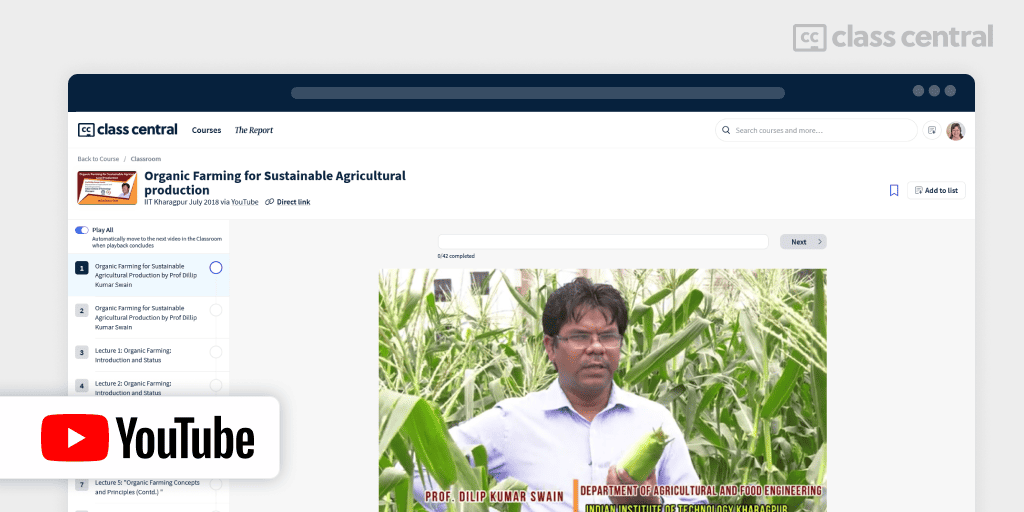
Although Organic Farming for Sustainable Agricultural production does not offer a certificate, it is on Class Central’s Best Online Courses of All Time list.
Led by Prof Dillip Kumar Swain, this course offers a comprehensive understanding of organic farming practices. It covers the principles, components, and management techniques necessary for sustainable agricultural production. There are no special requirements to take the course, making it accessible to anyone interested in the subject. The instructor brings expertise and a structured approach to the topic.
Learn about:
- The basics of organic farming, including its introduction, status, concepts, and principles
- The strengths, weaknesses, opportunities, and threats (SWOT) associated with organic farming
- Sustainable agriculture practices and key indicators for measuring sustainability
- The impact of organic farming on climate change and strategies to mitigate it
- Techniques for producing and marketing enriched vermicompost
- Pest and disease management
- Organic crop management for various types of crops, including vegetables, cereals, pulses, oilseeds, and plantation crops
- The transition process to organic crop production, planning, and rotation design
- Integrated farming systems, urban agriculture, and the quality of organic food
- The natural sources of antioxidants and their role in health defense, as well as the relationship between organic food and human health
- Standards, NPOP certification processes, operational structures, and marketing strategies for organic products.
“The course provided a comprehensive understanding of organic farming principles and techniques, greatly enhancing my knowledge in sustainable agriculture…” – C.Dhana Lakshmi.
| Provider | YouTube |
| Institution | NPTEL and Indian Institute of Technology, Kharagpur |
| Instructor | Dilip Kumar Swain |
| Time Commitment | 20 hours |
| Views | 15K |
| Rating | 4.7/5.0 (222) |
| Cost | Free |
| Quizzes/Assessment Items | Not available |
| Certificate | Not available |
Best Agribusiness Course (University of Adelaide)
If you’re interested in the intricacies of global food systems and the role of agribusiness within them, this course is ideal for you, whether you’re a beginner or already have some knowledge of the $5 trillion industry that is central to most economies. Understanding Agribusiness, Value Chains, and Consumers in Global Food Systems is delivered by the experienced team at The Centre for Global Food and Resources at the University of Adelaide, ensuring you receive expert guidance through the complexities of agribusiness, market dynamics, and consumer behavior.
Here’s what you’ll learn about:
- The distinction between agribusiness and other business sectors, and the unique characteristics of global food systems
- The concept of value chains and how they differ from supply chains, including the impact of external factors like globalization and climate change
- Dynamics of agri-food markets, including supply and demand influences, and the interpretation of supply and demand curves
- The role of consumers in the food system, understanding consumer trends and behaviors, and techniques used in market and consumer research.
“This is an excellent course for anyone who is interested in agribusiness, and who does not have a strong background in the subject…” – Jennifer M Stephens.
| Provider | edX |
| University | University of Adelaide |
| Instructors | Wendy Umberger, Elizabeth Gunner, Craig Johns, and Alexandra Peralta |
| Time Commitment | 8-12 hours |
| Enrollment | 24.4K |
| Rating | 5.0/5.0 (5) |
| Cost | Free audit |
| Certificate | Paid |
Also Great Agribusiness Course (Università Bocconi)
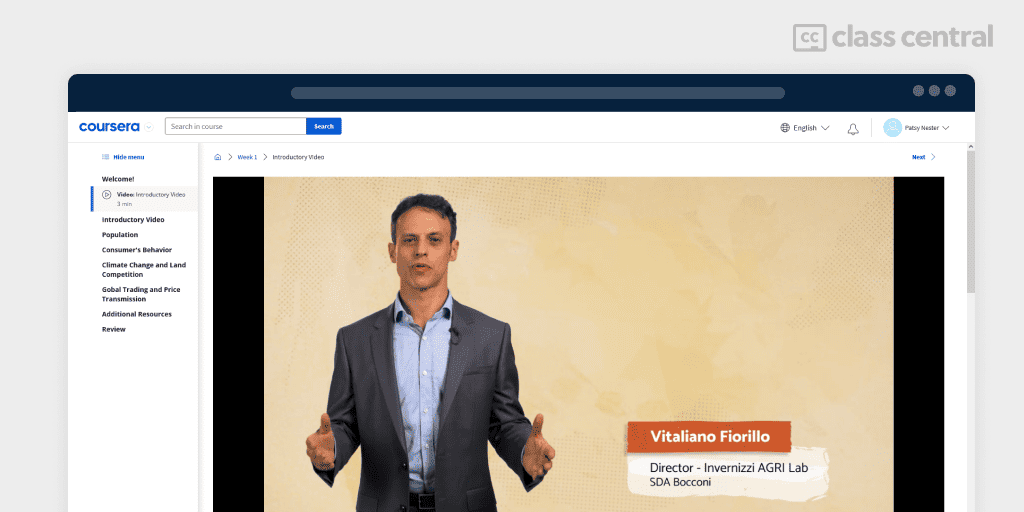
If you have less time, but want to learn about the multifaceted world of agribusiness management, consider Challenges of Agribusiness Management. Explore the complexities of agribusiness, particularly focusing on Italy as a case study for understanding global phenomena. You’ll benefit from the insights of Bocconi University Professors and industry leaders, including CEOs and top executives, who share their expertise.
You will learn about:
- The heritage and excellence of Italian agriculture and its global implications
- Challenges faced by the global agro-system, including population growth, dietary transitions, climate change, and the commoditization of agricultural products
- The role of sustainability in agriculture, exploring practices like crop rotation, organic farming, and the importance of farms in enhancing ecosystem services
- Innovation in agribusiness, covering topics such as “servicization”, vertical farming, biotechnologies, digitalization, and the use of big data and satellites in agriculture
- Developing new business concepts in the context of agribusiness.
“Really interesting course where I could have an understanding of the issues in Agribusiness Supply Chain and what it is actually facing and will face within the next years with practical examples.” – RM, Coursera learner.
| Provider | Coursera |
| Institution | Università Bocconi |
| Instructor | Vitaliano Fiorillo |
| Time Commitment | 5-6 hours |
| Enrollment | 17.3K |
| Rating | 4.8/5.0 (266) |
| Cost | Free Audit |
| Certificate | Paid |
Best Course for Beginners in Agricultural GIS (NPTEL and IIT, Bombay)
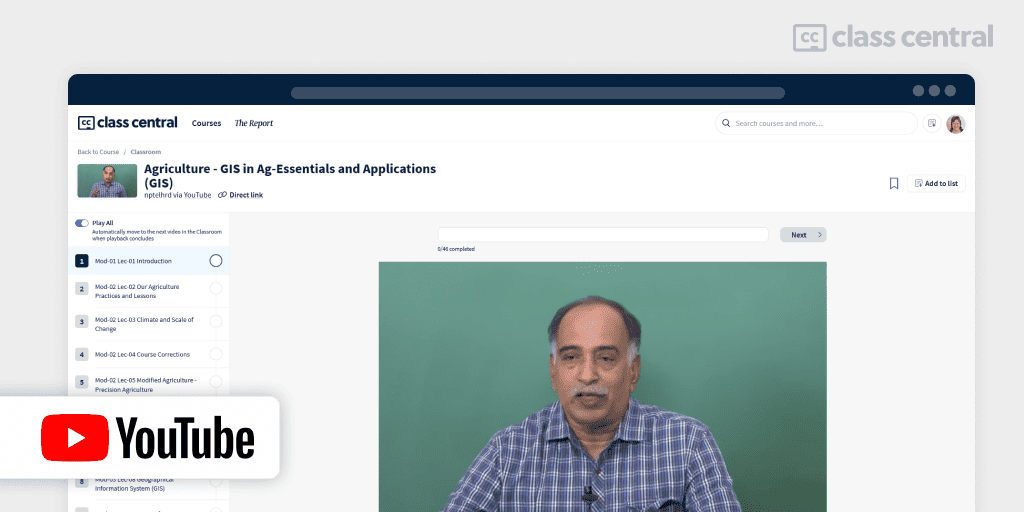
For those wanting to learn about the intersection of agriculture and technology, look no further than Agriculture – GIS in Ag-Essentials and Applications. This course is suitable for beginners who are keen to understand how Geographic Information Systems (GIS) can be applied in agriculture. It offers a comprehensive overview of the subject, starting with the basics of GIS and moving on to its applications in various agricultural practices. The instructors come from a strong background in the field, ensuring that you’ll be learning from experts.
And if you want to learn other uses of GIS, see our GIS BCG.
In this course, you will learn:
- The fundamentals of GIS and its significance in modern agriculture
- How GIS is used in precision agriculture and climate-smart agriculture
- Techniques for creating and analyzing maps, including map overlay and buffering
- The role of GIS in managing land information systems and village information systems
- The use of weather forecasts, satellites, and cloud patterns in agriculture
- Assessment of water resources, soil and water assessment tools (SWAT), and groundwater potential mapping
- Strategies for water security, land degradation, and water balance under different rainfall scenarios
- Approaches to drought risk assessment and the global perspective on drought monitoring
- The application of GIS in sustainable agriculture, including the assessment of water storage structures and the impact of climate change.
“This course is really amazing. If you happen to be a GIS person and wish to have food security analysis as one of your key areas, I would highly recommend this course to you.” – Lewis Mwambia Njoka.
| Provider | YouTube |
| Institution | NPTEL and Indian Institute of Technology Bombay |
| Instructor | R. Nagarajan and Venkataraman Balaji |
| Time Commitment | 8 hours |
| Views | 12K |
| Rating | 4.7/5.0 (30) |
| Cost | Free |
| Quizzes/Assessment Items | Not available |
| Certificate | Not available |
Best Digital Agriculture Technologies (DATs) Course (World Bank Group)
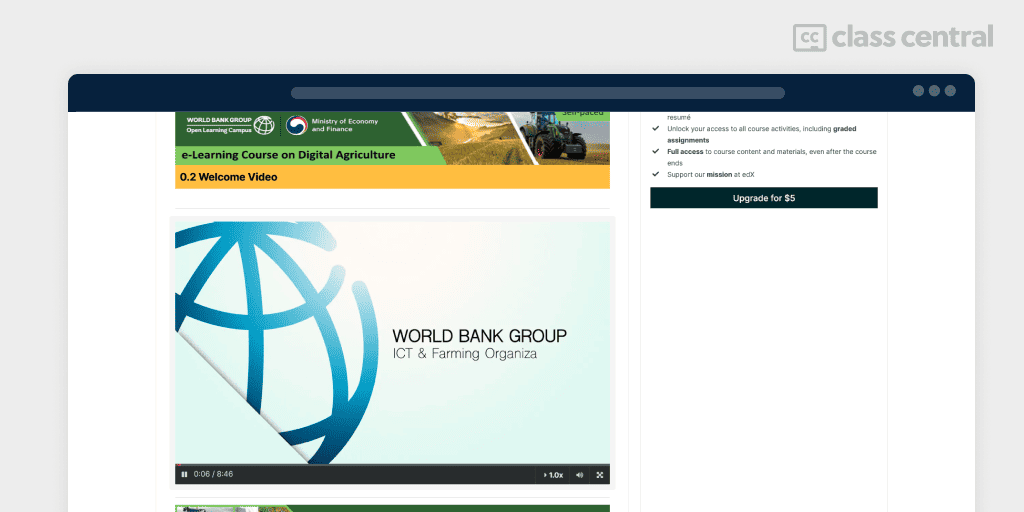
e-Learning on Digital Agriculture teaches individuals how Digital Agricultural Technologies (DATs) can transform the agricultural sector by increasing productivity, efficiency, and resilience to climate change. It’s suitable for beginners who are keen to learn about the potential impact of DATs and explore a range of technologies from mobile apps to solar applications. The course is comprehensive, providing a high-level overview and encouraging participants to engage with agriculture data platforms.
Here’s what you’ll learn from this course:
- The role of information and communication technology (ICT) and digital technologies in agriculture, including mobile technologies and their impact on rural development
- How ICT and digital tools can enhance on-farm productivity and improve farming practices through extension and advisory services
- The empowerment of smallholder farmers through ICT in financial services, addressing the digital, rural, and gender divides
- Strengthening agricultural market access using ICT and digital tools for better market intelligence and decision-making
- The use of ICT for remote sensing, crowdsourcing, and big data to promote sustainable and productive agricultural practices.
“…It will help people to gain knowledge on how to improve on farming methods by incorporating ICT and this will promote sustainable agriculture and ensure food security…” – David Halwoodi.
| Provider | edX |
| Institution | World Bank Group |
| Time Commitment | 10-15 hours |
| Enrollment | 15.4K |
| Rating | 4.2/5.0 (30) |
| Cost | Free audit |
| Certificate | Paid |
Best Course on Integrated Pest Management (NPTEL and University of Agricultural Sciences, Raichur)
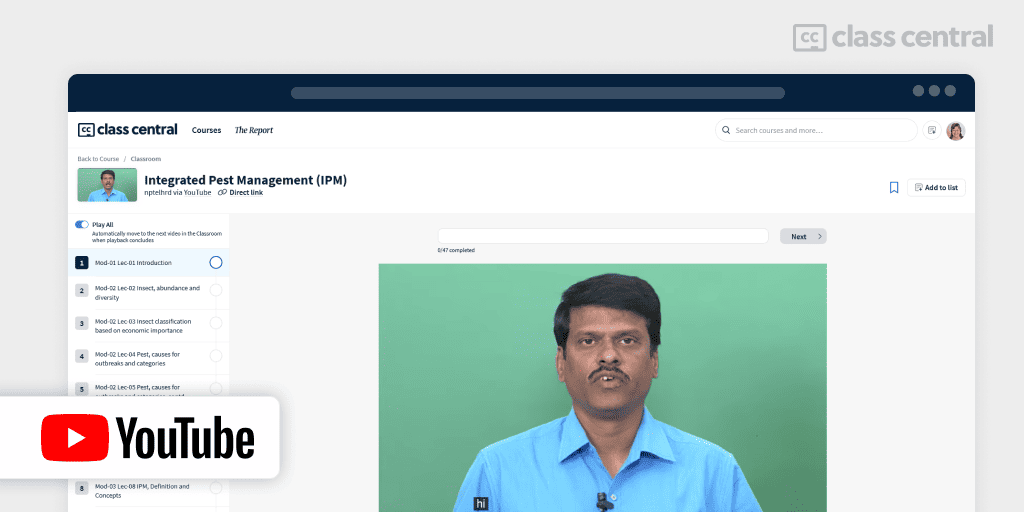
Integrated Pest Management (IPM) is particularly suitable for beginners and others who are keen to understand the fundamentals of pest management, agriculture, environmental science, or entomology. The course is comprehensive, covering a wide range of topics from the basics of insect abundance and diversity to advanced pest management techniques. The instructors and institutions behind this course are experts, ensuring that you receive quality education and insights into the latest IPM strategies.
This course will teach you:
- The principles of pest management and its history
- Definitions and concepts of IPM, including ecological methods such as legal, cultural, physical, and mechanical controls
- The role of host plant resistance and various biological control methods involving predators, parasitoids, microbes, and entomopathogenic nematodes
- Techniques to manage pests by modifying insect behavior, using sex pheromones, attractants, repellants, and radiation technology
- The use of botanicals and chemical controls in pest management, including the history, classification, and mode of action of different insecticide groups
- Strategies for managing insecticide resistance and integrating chemicals into IPM
- Biotechnological approaches in IPM and agro-ecosystem analysis
- Specific IPM strategies for particular crops: paddy, pigeon pea, groundnut, mustard, soybean, cotton, sugarcane, tomato, cabbage, mango, and grapes.
“This course has widened my knowledge on Pest Management Principles” – Wiseman Masika.
| Provider | YouTube |
| Institution | NPTEL and University of Agricultural Sciences, Raichur |
| Instructors | Prabhuraj A., B.V. Patil, M. Bheemanna |
| Time Commitment | 10 hours |
| Views | 51K |
| Rating | 4.8/5.0 (37) |
| Cost | Free |
| Quizzes/Assessment Items | Not available |
| Certificate | Not available |
Best Farming Course for Beginners (The Dutch Farmer)
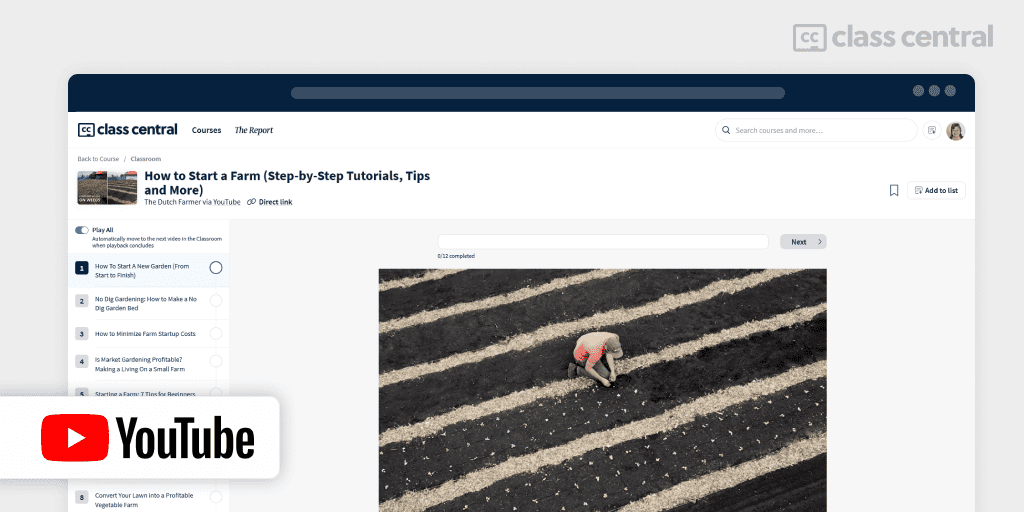
If you’ve ever dreamed of starting your own farm and are looking for a comprehensive guide to get you from concept to crops, this course is ideal for you. It’s perfect for beginners who are interested in learning the step-by-step process of establishing a farm, with a focus on minimizing startup costs and maximizing profitability. How to Start a Farm is packed with practical tips and tutorials to help you make a living from your land.
In this course, you will learn:
- The complete process of starting a new garden, including no-dig gardening techniques
- Strategies to reduce the initial costs of starting a farm
- Key considerations before starting a farm
- The profitability of market gardening and how to make a living on a small farm
- Essential tips for beginners on starting a farm from scratch
- Low-cost tools and equipment needed for a market garden startup
- How to transform your lawn into a profitable vegetable farm
- Insights from an experienced Dutch farmer
- Various methods to sell home-grown vegetables.
Find more farming videos from The Dutch Farmer on YouTube.
“The course was highly motivating. I am looking forward to start putting what I have learnt into practice. One cannot put a price to it…it is Priceless… ” – Jannie Hermans.
| Provider | YouTube |
| Institution | The Dutch Farmer |
| Time Commitment | 3-4 hours |
| Rating | 5.0/5.0 (4) |
| Cost | Free |
| Certificate | Not available |
Best Home Horticulture Course (University of Missouri)
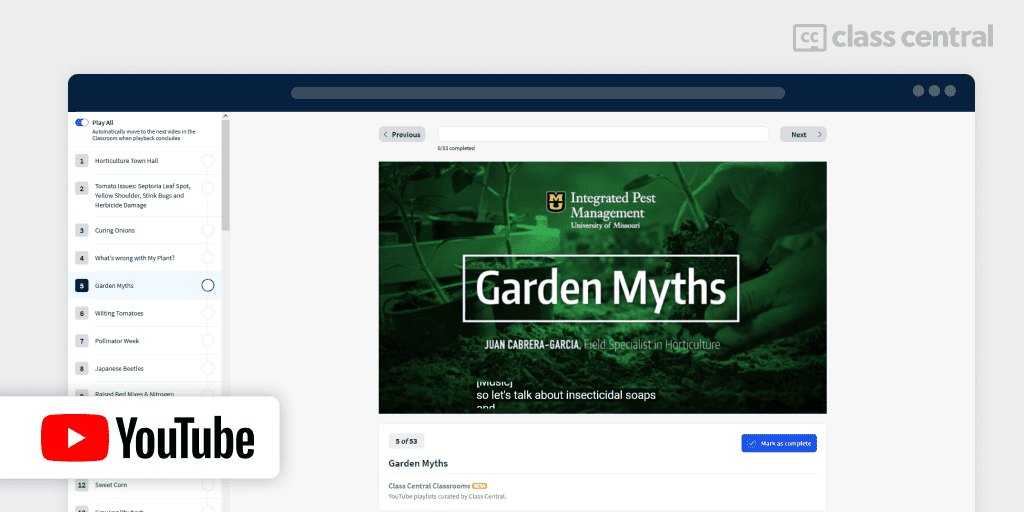
Do you have an interest in gardening and plant care? Home Horticulture is ideal for beginners or those with some gardening experience. Many of the videos are structured as “Question of the week” and discuss a wide range of horticulture issues, from the basics of planting and soil care to dealing with pests and diseases. The University of Missouri’s Integrated Pest Management department gives you expertise and a wealth of knowledge.
Learn:
- Best practices for planting, including trees, mums, and cool-season lawns, and the science behind fall foliage
- Tips for gardening maintenance, including repotting houseplants, pruning grapes, and transplanting irises
- How to save seeds, such as tomato seeds, and strategies for reseeding lawns
- Techniques for controlling garden pests and diseases, including deer, squash vine borers, and apple issues
- Methods for dealing with environmental stressors like drought, storm damage, and herbicide drift
- The importance of pollinators and how to create bird and pollinator-friendly environments
- Food preservation processes, soil testing, and debunking common garden myths.
“This course is very interesting and informative. The subjects covered on all the crops are very useful and helpful. Practical knowledge, especially on pest control measures, are in-depth…” – Imchalemla.
| Provider | YouTube |
| Institution | University of Missouri |
| Instructor | Various |
| Time Commitment | 13 hours |
| Views | 3.6K |
| Rating | 4.9/5.0 (14) |
| Cost | Free |
| Certificate | Not available |
Bonus (Paid) Course: Growing Microgreens (Alex Field)
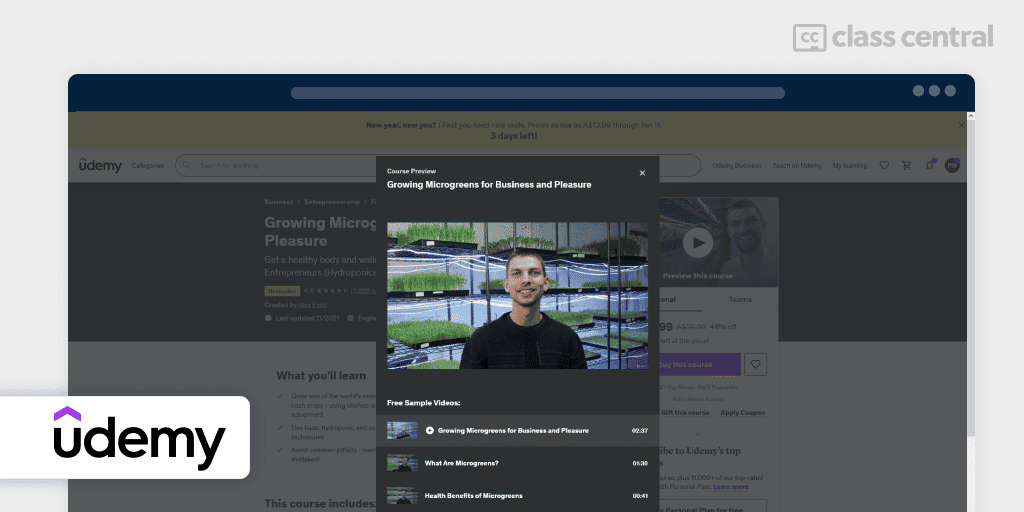
After 10 free courses, I couldn’t resist including this paid course! Alex Field grows microgreens in his basement and sells them to local restaurants. If you’d like to harness the power of vertical farming, either for your health and pleasure or as a business venture, join Growing Microgreens for Business and Pleasure. It’s perfect for health-conscious gardeners and aspiring entrepreneurs alike. Don’t worry if you’re a beginner; this course is designed to provide you with an understanding of both hydroponic and soil growing techniques. The instructor brings valuable insights from his own experience of growing and selling microgreens in England, ensuring that you learn from real-world successes and mistakes.
In this course, you will learn how to:
- Grow microgreens using vertical farming techniques, maximizing your space and yield
- Start your microgreen garden with basic equipment, adapting to indoor or outdoor settings
- Utilize both hydroponic and soil-based growing methods tailored to your local climate
- Market and sell your produce effectively to turn your microgreens into a profitable venture
- Avoid common pitfalls in microgreen farming by learning from the instructor’s experiences.
“Watch this many times. Followed to the dot. Got lovely and Healthy microgreens. Thank you for sharing.” – Rowenah C.
| Provider | Udemy |
| Instructor | Alex Field |
| Time Commitment | 1-2 hours |
| Enrollment | 13.1K |
| Rating | 4.7/5.0 (3.1K) |
| Cost | Paid |
| Certificate | Paid |
Why You Should Trust Us
Class Central, a Tripadvisor for online education, has helped 80 million learners find their next course. We’ve been combing through online education for more than a decade to aggregate a catalog of 250,000 online courses and 250,000 reviews written by our users. And we’re online learners ourselves: combined, the Class Central team has completed over 400 online courses, including online degrees. I’ve personally completed over 200 online courses in a variety of topics.
How We Made Our Picks and Tested Them
Trying to find “the best” can be daunting, even for those of us who live and breathe online courses. Here’s how I approached this task.
First, I combed through Class Central’s Catalog and the internet to find a variety of free and paid open courses, some with certificates. You don’t need to enroll in a university to learn about agriculture.
When choosing courses, I considered the following factors:
- Renowned Institutions: I looked for recognized institutions in agriculture
- Instructor experience: I sought instructors with extensive experience in agriculture and engaging presentation styles
- Popularity: I checked numbers of enrollments and views to find popular courses
- Course content: I examined courses that covered a range of topics and presentation styles, including the basics and more advanced topics. I watched some course videos to sample courses I hadn’t already taken
- Learner reviews: I read learner reviews (when available) to get a sense of the quality of each course, leveraging the Class Central database with its thousands of course ratings and reviews written by our users as well as available course provider reviews.
Then, I defined the scope for these recommendations. An agriculture course can cover various topics, so I chose top courses from a range of sub-fields.
Ultimately, I used a combination of data and my own judgment to make these picks. I’m confident these recommendations will be an interesting and reliable way to learn about many aspects of agriculture.









Tejaram Choudhary
Good collection of practical and useful courses. I am interested in The Best Farming course for beginners.